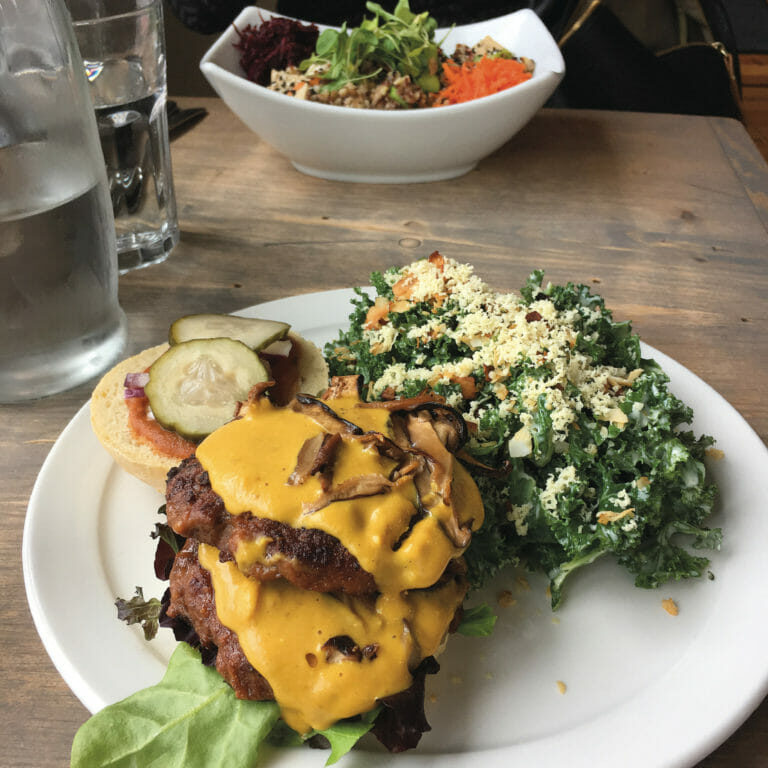
Putting your money where your mouth is
Making veganism accessible in Halifax
Wanting to go vegan has never been as easy as it is today, especially in cities like Halifax.
More vegan restaurants are opening and others are including vegan options in their menus. Grocery stores are carrying vegan alternatives, and health supplements are more readily available.
But at the cost of not eating Miss Piggy – how attainable is it really?
There’s a misconception that vegan diets are for the rich, but a recent survey conducted by Dr. Sylvain Charlebois, Dean of Dalhousie’s Management Faculty, revealed otherwise.
“The veganisim rate for people who earn below $40,000 is actually higher than people who earn $140,000 per year. So no, I don’t think veganism is only for the rich,” says Charlebois.
The survey revealed that 51 per cent of all vegans are under the age of 35 in Canada. Charlebois attributes this statistic to being a “generational thing.”
With an influx of millennial vegans, Charlebois believes that their children will become vegan too.
And thanks to documentaries like Vegucated and Forks over Knives, media issues like Molly the adopted pig, and your vegan friend’s tasty snacks are all possible reasons you may choose to put your values above eating animal by-products.
Three-year vegan and University of King’s College student, Ethan Speigel says, “I’ve shown people my shopping list, and if you just don’t buy any of the stupid, obnoxious, really expensive fake vegan products and just buy beans and vegetables – it is quite sustainable.”
“If I’m buying quinoa, and this amount of rice and these vegetables – some people would complain that it’s not that broad of span in terms of culinary options – but I personally have never found it a detriment to my lifestyle,” he says.
When you’ve vegan your choices become a lot smaller, and your options at times are nonexistent.
“There are some compromises I had to make when I was travelling, like the only things they were serving likely had butter in them,” says Speigel.
It can also be exhausting.
“When hosts ask ‘oh what are your dietary restrictions,’ and I have to give a long list or just say vegan […] being a burden is not enjoyable. It feels like it’s rude or presumptuous.”
For Speigel the temptation of food he once enjoyed is always smelling up the room.
“I have to fight it,” he says.
The vegan movement might be financially possible at a lower income while sacrificing variety, but that doesn’t mean it’s for everyone.
Some people are concerned about getting enough nutrients.
“Even if there are nutrient deficiencies, there are supplements to take. If someone feels great on a vegan diet, then that is for them,” says dietician, Nicole Marchand via email. “I have a lot of clients who thrive on the diet by way of more energy, increased ability to concentrate and better sleep, and then I have clients who feel tired and sluggish. It is very personal to be honest.”
Charlebois’ survey found that those in rural communities were also less likely to have a vegan diet, as opposed to those in suburban areas.
Speigel points out that being vegan is more advantageous in a more urban centre or area such as Halifax or Toronto. There are places where being vegan is just not possible.
“Some communities in Northern Canada, particularly Aboriginal communities that have so little access to a span of groceries, because it is so hard to get produce there, there’s really no choice sometimes,” says Speigel.
Charlebois’ found that 32 per cent of Canadians follow a dietary practice or restriction.
As our diets change so to do the guiding principles on nutrition intake.
In April 2017, the Government of Canada released modified guiding principles for Canada’s Food Guide. In these newly modified principles they included “protein-rich foods” and go on to explain that these can be plant-based proteins, not just meat.
Vegans can only hope that as more people change their diets that the options will continue to grow as well as the recognition in things such as Canada’s Food Guide.






